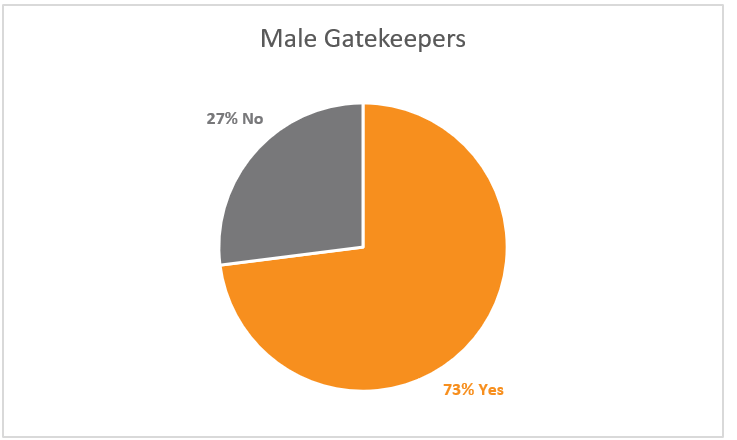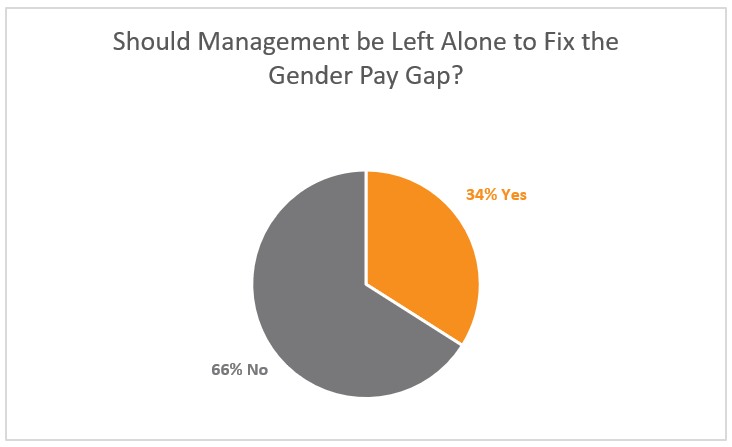96% of Corporate Leaders say Gender Pay Gap Must be Fixed But Disagree on How to Fix

The momentum is building, you read and hear about it almost daily. More board, CEO and top-level jobs are going to women in almost every industry and the drumbeat about the gender pay gap is loud and clear. But is this more of a media movement than a real fix? Will the momentum die before 50/50 leadership is achieved and before women and men are paid the same?
While there is an overwhelming number of articles and studies supporting gender diversity and the necessity to close the pay gap, we wanted to know how corporate leaders (who are mostly male) are reacting and responding to the movement. Are top male leader’s views different from top female leaders?
We surveyed 100 of the gatekeepers, a virtual consortium of top leaders who are CEOs, Board members, other C-level leaders, as well as talent leaders, Private Equity Partners and Executive Search Partners to get an idea of how top leaders are trending on the gender pay gap. 50 out of 100 gatekeepers responded to the survey.
DO THE GATEKEEPERS BELIEVE THAT WOMEN ARE PAID UNFAIRLY?

Yes. 96% of the gatekeepers say the gender pay gap is real and must be fixed. Here we saw clear solidarity among the leaders.*
Mark Sullivan, President of Buckhorn, shared his thoughts, “In nearly every organization I have joined, I am surprised by the pay inequity disadvantaging females. It seems to come from carelessness, but the checks to eliminate it are inadequate. It especially impacts women who have non-traditional career paths or come into the organization with a significant pay difference and no one corrects it at the outset or even over time.”
“Women have been some of my best bosses and mentors; any gender pay gap is unfair and must be closed,” shared Carlos Cata, Managing Partner at Caldwell, and Board Member at Make-A-Wish.
Lonnie Shoff, President of Thermo Fisher Scientific commented, “Every leader needs to be progressive and proactive and make sure that there is pay parity on their team. We all need to fight bias. Once you get into a leadership position, you have the power to make a difference. Given we have been aware of the pay gap for more than 50 years and it still exists, it is clear that some leaders need a law or regulations to make pay equity a priority.”
WE ASKED, “HOW DO WE FIX THE INEQUITY?”

Regarding how to fix the pay gap, the solidarity broke down.
73% of male gatekeepers say management alone can and will fix the issue.

Ed Evans, Chief People and Culture Officer of Four Seasons Hotels and Resorts, “It is the right thing to do and the right way to do it. Management has the best chance of achieving sustainable progress.”
Rick Stepien, CEO of ZSI-Foster adds, “Smart management will figure it out.”
Michael Alicea, Executive Vice President and CHRO of Nielson weighed in, “Personally, I don’t like regulation…where does it stop? That is the issue.”
“Whenever inequalities exist, we should be looking to leaders to right the ship, more laws and regulations are not the answer,” adds Jim Dorey, President of Price Rite Supermarkets.
Even Mark Sullivan agreed with a check in the box, “Management should fix.”
Henry Pittman, the former Chairman of the Strategy Channel Global Advisory Board at Innovation Enterprise, said “Pay equity is a leadership issue and leadership issues are fixed by leaders and not by laws or regulations.”
Dave Winston, Managing Partner at Caldwell Partners, felt strongly about management’s prerogative too, “You can’t legislate judgement; this is a leadership issue. Period.”
27% of male gatekeepers believe management needs a push from government.
Brendan Castle, Global Head of Staffing at Google, picked all the above on the multiple-choice question. “We need laws, regulation, the courts and management to fix this problem.”
“Purely legal solutions may be hard but increased mandatory reporting requirements for employers, both public and private, are good to create transparency and create market/peer pressure, ” said Glen Hofmann, CAO at New York Life, who believes that management is the most critical part of the fix, but not enough.
Byron Clendenen, Vice President of Human Resources at Singulex said “While indeed, management SHOULD fix, that potential means for resolution hasn’t been uniformly achieved. While I’m generally not of a governmental interventionist mindset, I do believe that is the solution to this.”
And Serge Dumont, former Vice Chairman at Omnicom, says, “History has proven that regulatory frameworks promoting transparency are the most effective way to make change happen fast and drive long term shifts in behavioral norms”
66% of female gatekeepers believe management alone is not enough.

“Women are less likely to negotiate for a pay increase, and we need to be committed to fairness for all employees. I believe that we need management and regulation to make it happen,” shared Louise Firestone, SVP and General Counsel of LMVH and a Board Member of Marc Jacobs.
“I think tremendous progress has been made, but overall inequity still exists. We need to accelerate the process beyond management,” shares Donna Love, CFO of Pepsi Lipton.
A female gatekeeper who prefers to remain anonymous agrees, “In the Private Equity industry, there is always a pushback on compensation. And because of the barriers to women, sometimes they exchange compensation to get into the industry. We need increased regulation as well as a commitment from management to fix the disparity.”
Donna Morea, Chair of the Board of Directors at SAIC and Board Member at SunTrust, leans in, “As an advocate for the free market, I generally hate legislated solutions. But statistics are still so significantly skewed and progress is uneven at best. I now believe a law may be the only way to systematically make up the difference in pay between men and women. The disappointing reality is that constitutional support may be the only way to ensure a system that is based on individual merit and not on gender.”
1 in 3 top women leaders want management alone to fix the gap.
Bonnie Gwin, Vice Chairman and Co-Managing Partner at Heidrick & Struggles said “I think great leaders understand that pay equity is a real concern and has a grave impact on a company. Leaders should be held accountable for ensuring that the playing field is level and that pay is equal. This is an important issue that should be handled directly by top management to resolve swiftly.”
“While I strongly believe in equal pay for equal work, management are the right ones to fix the problem,” commented another female gatekeeper.
Should management fix the gender pay gap on their own?
A significant majority of the gatekeepers believe pay is something that should be determined solely by management and that majority opinion is driven currently by corporate leaders who are mostly men. We could speculate that as more women take leadership roles, management opinion will change and perhaps the pay gap will disappear as a result. But how long with that take? Will 50% of leadership positions ever turnover from men to women?
A compromise?
A female gatekeeper, who chose to remain anonymous, picked “none of the above” as her answer to the survey question. Her fix? “It should be something that shareholders and customers demand of the business.”
Another gatekeeper, Nigel Hurst, Executive Vice President of Human Resources at HEI Hotels and Resorts, offered a compromise along those lines. His fix? “Implement what has been widely accepted in the U.K., a less aggressive regulation that creates peer pressure.”
How do shareholders and customers know if your pay practices are fair?
Is the U.S., there is no way for them to know, unless they request the data. Shareholders and customers know in the United Kingdom. While the UK has not created regulation that requires companies to compensate women and men equally, it has required that companies publish their compensation data, thereby showing shareholders and customers where the gaps exist. Technically a regulation, but an interesting one – transparency and peer pressure has always been very strong motivators. And it doesn’t sound like blunt force can be used by government to fairness/equity regulations in the U.S.
*72% of the gatekeeper’s community are male and 28% are female. The gender ratio of survey respondents was 70% men and 30% women.
